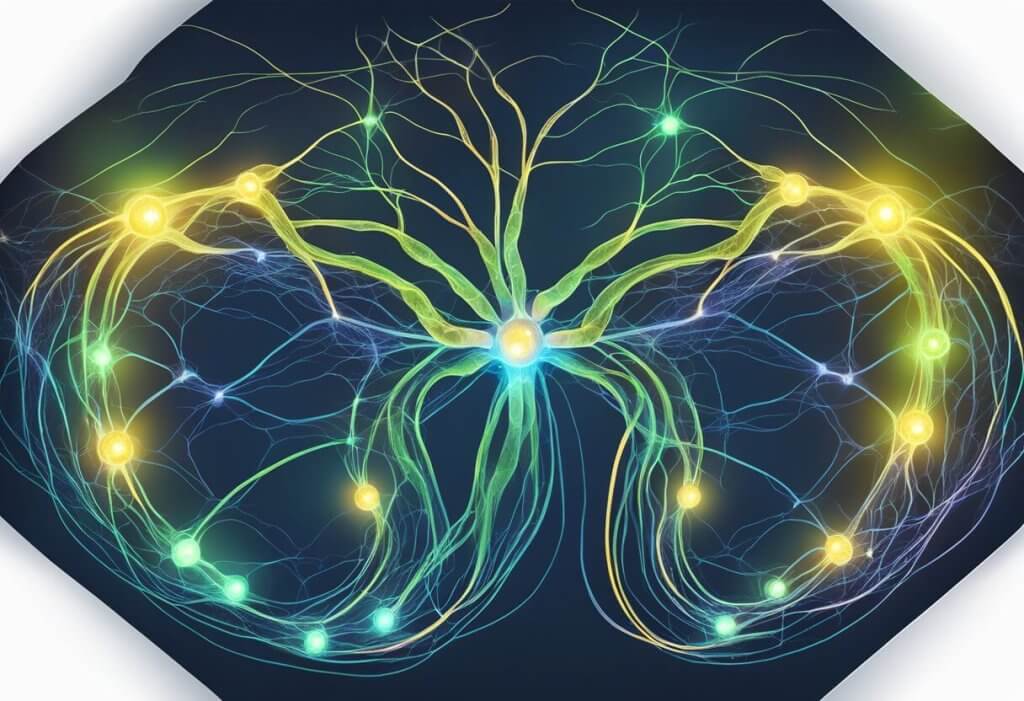What You Need to Know
Disclaimer: The anecdotal benefits of CBD mentioned on this website are based on preliminary research and individual user experiences. All information presented here is not meant to substitute for or replace information from health care practitioners. Please click here for our full disclaimer, including side effects, FTC position, etc.
Nerve pain affects approximately 7-10% of the general population, who often find little relief from conventional treatments. Could CBD offer a glimmer of hope?

If you’re one of the countless individuals grappling with the relentless, shooting, or burning sensations of nerve pain, you know all too well how it can disrupt your daily life and leave you feeling desperate for relief. While traditional medications and therapies may provide some respite, many are left searching for alternative options that could offer more effective and lasting results without unwanted side effects.
Enter CBD, or cannabidiol – a natural compound derived from the hemp plant that has been gaining attention for its potential to alleviate various types of pain, including the often hard-to-treat nerve pain. As more people turn to CBD in hopes of finding a solution to their suffering, it’s crucial to understand how this fascinating compound works and whether it could be the key to unlocking much-needed relief for those living with nerve pain.
Join us as we delve into the world of CBD and its potential benefits for nerve pain sufferers. We will explore the science behind this natural remedy and the experiences of those who have found solace in its use. Together, we’ll uncover the truth about CBD and nerve pain, empowering you with the knowledge you need to make informed decisions about your health and well-being.
Key Takeaways
- CBD is under investigation for its potential to manage nerve and neuropathic pain.
- Anecdotal evidence suggests CBD may provide some individuals with pain relief.
- It is important to choose the right CBD product for your needs and consult with a healthcare provider.
Understanding CBD and Its Role in Nerve Pain Management

With growing interest in natural remedies, CBD has gained attention for its potential role in nerve pain management. This section discusses current scientific research, reviews studies on CBD’s effectiveness for neuropathy, and compares it with traditional medications.
Scientific Research Supporting CBD for Nerve Pain Management
Scientific exploration into CBD (cannabidiol), a prominent cannabinoid from the cannabis plant, shows promise for nerve pain relief.
Researchers are particularly interested in its interactions with the endocannabinoid system, a complex network of receptors in the central nervous system. Studies suggest that CBD may alleviate pain by influencing cannabinoid receptors, potentially reducing inflammation and disrupting pain signals.
Review of Research on CBD and Neuropathy
In their quest to understand CBD’s efficacy for neuropathic pain, healthcare professionals have conducted various animal and limited human studies.
Data indicates CBD may decrease symptoms like pain and anxiety, conditions often associated with neuropathic disorders such as epilepsy. While research is ongoing, early clinical trials offer a cautiously optimistic outlook.
“CBD may hold promise for treating neuropathic pain through its anti-inflammatory properties and by interacting with the endocannabinoid system involved in pain processing.”
Dr. Ethan Russo, neurologist and cannabis researcher.
Comparing CBD with Traditional Medications
Comparatively, CBD offers a different approach to nerve pain management from traditional medications, such as opioids.
CBD is not classified under the Controlled Substances Act, meaning it’s legally distinct from cannabis with THC. While opioids are effective, they come with risks of dependency and various side effects.
CBD, on the other hand, poses fewer risks of dependency and has a lower profile of side effects. However, CBD may have drug interactions that should be monitored by a healthcare professional.
Choosing the Right CBD Product for Nerve Pain Relief

When managing nerve pain, selecting a suitable CBD product is crucial for maximizing relief while minimizing potential risks. Individuals should consider the product type, safety, side effects, and recommended dosages.
Types of CBD Products and Their Efficacy
CBD Oil: Often used for its convenience and fast absorption when placed under the tongue.
Gummies and Capsules: These edibles offer a pre-measured dose and are easy to take, though they may have a delayed onset due to digestive processing.
Topicals: Creams, balms, and lotions applied directly to the skin can target localized pain with added ingredients like menthol or camphor for a cooling effect.
Tinctures: Similar to oils, these are taken sublingually and come in various potencies for tailored pain management.
Patches: Provide steady, long-term delivery of CBD and can be particularly effective for chronic conditions.
Efficacy varies by product and individual needs. Topical CBD might be preferred for localized joint pain or arthritis, while systemic forms like oils or capsules could be better for overall nerve damage or multiple sclerosis.
Safety, Side Effects, and Quality Considerations
Safety: CBD is generally considered safe, but due to the grapefruit warning, it can interact with other medications.
Side Effects: Common side effects include drowsiness, dry mouth, diarrhea, and lowered blood pressure.
Third-Party Testing: To ensure purity and potency, look for products that have undergone ISO 17025-compliant testing for pesticides and heavy metals.
Ingredients: High-quality products typically list all ingredients, including the type of CBD used—full-spectrum (includes THC), broad-spectrum (THC-free), or CBD isolate.
Certificate of Analysis (COA): A document from third-party testing that verifies the product’s contents and concentrations.
Quality CBD products come from U.S.-grown hemp and follow the guidelines of the 2018 Farm Bill. The FDA has yet to fully regulate CBD, so researching brands and reading labels for COA is essential.
Guidelines for CBD Dosage and Administration
Dosage: Begin with the manufacturer’s recommended dosage, and adjust based on personal effectiveness and medical conditions.
Administration: Follow the instructions on the packaging. Sublingual administration allows for quick onset, while edibles require more time.
Medical Considerations: Consult healthcare providers, especially for individuals with medical conditions like fibromyalgia or back pain, to determine the appropriate dosage and avoid potential risks.
Promising Study: A 2020 study found that topical application of CBD oil can achieve significant improvement in neuropathic pain severity and other disturbing sensations like tingling and numbness.
https://pubmed.ncbi.nlm.nih.gov/31793418/
Frequently Asked Questions
CBD’s potential for providing relief to neuropathic pain is a topic of growing interest and ongoing research. The following frequently asked questions offer insights into how people are using CBD for nerve pain management.
Can CBD topicals provide relief for neuropathic discomfort?
For those experiencing nerve pain, CBD creams might offer relief. Products containing menthol and other ingredients might help lessen the discomfort when applied to the skin.
How might CBD oil impact chronic neuropathy pain?
Some individuals find that using CBD oil might have a beneficial impact on chronic neuropathy pain. It’s thought that CBD oil could potentially reduce inflammation and alleviate pain by interacting with the body’s endocannabinoid system.
Are there any recent advances in managing nerve pain with CBD?
Research is continuously evolving, and recent studies aim to pinpoint the effectiveness of CBD for nerve pain. Innovations include various formulations and delivery methods designed to enhance CBD’s pain-relieving properties for neuropathic pain.
What do people generally prefer for easing severe nerve pain symptoms?
Preference varies greatly, but many people are turning to CBD products as a natural alternative to ease severe nerve pain symptoms. Products range from topicals and oils to gummies, with many favoring those with full-spectrum CBD.
How does CBD compare to other nerve pain relief methods?
Compared to traditional pain relief methods like over-the-counter painkillers or prescription medications, CBD is often viewed as a natural alternative. However, its effectiveness can be subjective.
The relief also varies among individuals. Some report significant relief, while others note minimal change.

